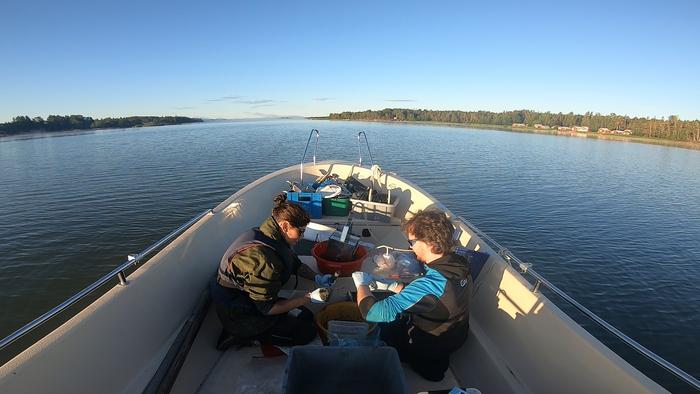Coastal ecosystems serve as vital interfaces between land and sea, offering a myriad of ecological functions essential for both marine life and human society. However, these ecosystems face increasing pressures from human activities, leading to environmental changes with consequences both for ecosystems and the human society. To delve deeper into these dynamics, a recent scientific study compiling a large dataset from 2003 to 2022 from the Åland archipelago sheds light on the intricate relationships between environmental drivers, marine invertebrate communities, and ecosystem functions.

Credit: © Maïté P. Jacquot
Coastal ecosystems serve as vital interfaces between land and sea, offering a myriad of ecological functions essential for both marine life and human society. However, these ecosystems face increasing pressures from human activities, leading to environmental changes with consequences both for ecosystems and the human society. To delve deeper into these dynamics, a recent scientific study compiling a large dataset from 2003 to 2022 from the Åland archipelago sheds light on the intricate relationships between environmental drivers, marine invertebrate communities, and ecosystem functions.
“All the authors – myself included – are grateful to the many students and researchers from Husö Biological Station (Åbo Akademi University, Finland) who have been collecting invertebrates living in the sediments of the seabed over the years, allowing for such in-depth studies”, says Dr. Maïté P. Jacquot, lead author of the study and recent PhD graduate from Åbo Akademi University.
The study, entitled “Trait responses to direct drivers and effects on multiple macrofauna-mediated ecosystem functions,” delves into the responses of coastal invertebrate communities to various environmental and human-induced stressors. Through a comprehensive analysis of spatial-temporal data, researchers uncovered compelling insights into the structuring of marine invertebrate communities and their implications for the ecosystem.
The results published in the journal Marine Ecology Progress Series identified exposure to wind-waves and human-induced pressures, such as fish farming, as primary drivers shaping these communities in the Åland archipelago. Distinct gradients in environmental variables, sediment properties and human activities, played a pivotal role in influencing species compositions across different coastal zones.
“One of the significant implications of this study lies in understanding how changes in marine invertebrate communities’ impact essential ecosystem functions. From the oxygenation of the seafloor to nutrient fluxes, and to the role of the fauna as a central food resource for various predators and bottom-dwelling fish, our research elucidates the intricate connections between coastal invertebrates’ communities and ecosystem processes”, says Dr. Jacquot.
As we navigate through unprecedented environmental challenges, studies like these provide invaluable insights into the complex dynamics of coastal ecosystems. By unravelling the interplay between natural and human-induced pressures, researchers aim to pave the way for informed conservation and management strategies to safeguard these critical habitats.
The Åland archipelago study offers a perspective on the intricate relationships between environmental drivers, marine invertebrate communities, and ecosystem functions in coastal ecosystems. By deciphering these complexities, researchers move closer to addressing the challenges posed by human-induced pressures and ensuring the resilience of coastal habitats for generations to come.
Maïté P. Jacquot has recently completed her Ph.D. degree at Åbo Akademi University on the impacts of human activities on invertebrates in several areas of the world, including the Åland islands and the mangroves of Senegal.
Contact information:
Maïté P. Jacquot
Environmental and Marine Biology
Email: maite.jacquot@abo.fi
Phone: +33 6 10 03 35 82
Click here to watch how fieldwork is carried out on Åland Islands:
Click here for more information about Maïté P. Jacquot PhD studies
Click here for more information on Maïté P. Jacquot’s research in the mangroves of Senegal
Click here to discover more about the Husö biological station
Original peer-reviewed article:
Jacquot M.P., Snickars M., Bonsdorff E., Nordström M.C. (2024). Trait responses to direct drivers and effects on multiple macrofauna-mediated ecosystem functions. Marine Ecology Progress Series.
The dataset is available here:
Jacquot M.P., Weigel B., Herlevi H., Pykäri J., Villnäs A., Cederberg T., Aarnio K., Nygård H., Snickars M., Bonsdorff E., Nordström M.C. (2024). Macrofaunal communities abundances, biomass and traits in relation to their environment between 2003 and 2022 in Åland Islands, Baltic Sea. Mendeley Data,
Journal
Marine Ecology Progress Series
Method of Research
Case study
Subject of Research
Animals
Article Title
Trait responses to direct drivers and effects on multiple macrofauna-mediated ecosystem functions.
Article Publication Date
20-Jun-2024



